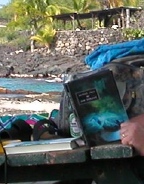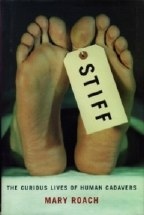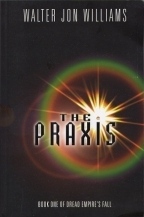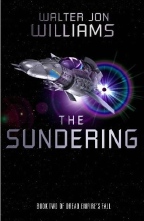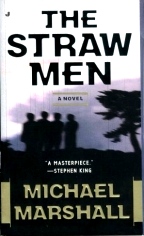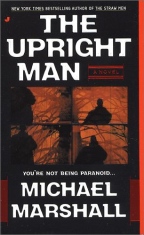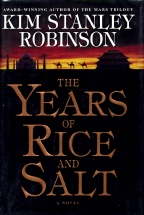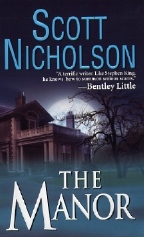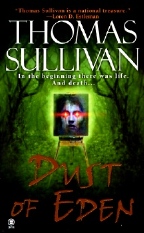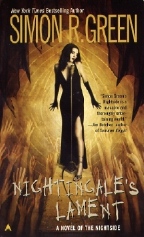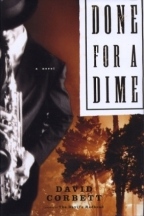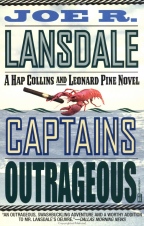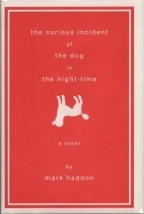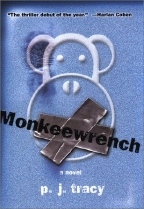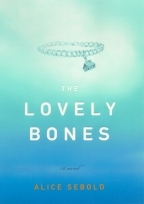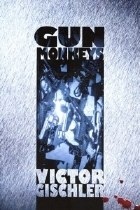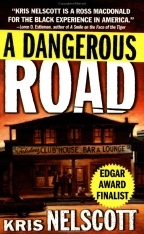Beach Reading
The Agony Column for June 14, 2004
Commentary by Rick Kleffel and Terry D'Auray
Now this might be something of an odd admission coming from a guy who claimed to have read an $Umpty-ump.00 edition of Tim Powers' 'Last Call' by the side of Pinecrest Lake. But I'm a professional hypocrite, so don't try those kinds of experiments at home. Heed my warning. Leave the good stuff at home to read in the Quiet Hours. Maybe that's not plural. Maybe it's not even measurable in hours. The best way to read that Neal Stephenson limited edition is to find the rare Slice of Time in Safety (SoTiS) -- and to wear gloves.
Then step this way, readers, because there's a lot love out there. Your first resort is to look at those lists of "best books of 2003", because just about now, those books are being issued left and right in trade paperback. If they were worth your time in hardcover last year, they're doubly worth your time in trade paperback this year. And even if you bought the hardcover last year, you know that these authors are worth owning twice. You can keep that hardcover in place for your SoTiS. But for your rough-and ready hike from the car to the picnic bench, thence to open the soda and watch the kids, you can drag out the reprint, dog-ear the pages, break the spine and perform all manner of mayhem on the poor dears that would be verboten in the case of first-firsts. And should be in the case of paperbacks as well, as far as I'm concerned. But I'm one of those people who can read a mass-market paperback and never crinkle the spine. But alas, no matter what I read I tend to get a bit of grit on the pages.
Walter Jon Williams has two, count 'em two thirds of a series out with the final installment due out in the UK, at least, in a beach-compatible trade paperback in November. I read 'The Praxis' in Hawaii. It deserves Hawaii. It deserves Tahiti, Cannes and whatever beach it was that Peter Benchley sent that homicidal shark to visit. 'The Praxis' gives you all the blessed brain-burning tropes of space opera; galactic travel, alien races, political intrigue, fleets of fighting starships -- and it gives you an extra layer of light wit, like the perfect sorbet. There's a hint of Wodehouse as the clever are forced to guide the clueless. Complex but familiar flavors with a touch of class. The first installment left me giddy with desire to read 'The Sundering', and I've been jealously hoarding it for the perfect time. Funny thing about Hawaii; the only beach that could give it a run for its money is the one only a short walk away, on Monterey Bay. I'm ready to deploy my super-secret space weapon. Now you can -- and should as well. As summer fades, we can, in the long lingering light of autumn, finish off a sumptuous meal with 'The Orthodox War'. That's a book title, not a newspaper headline.
While
I often complain about the vagaries of US publishing, sometimes
I find myself happily on the receiving end of what
would normally
annoy me. Yes, I do think that Michael Marshall Smith should
get to put his whole name on a paperback book. And he certainly
deserves
a first-run hardcover. But I got a copy of the mass-market
paperback of 'The
Straw Men'
long before I got round to buying the UK hardcover version.
But Smith's the kind of guy you do that for. And now, I
can get a UK hardcover copy of 'The Lonely Dead' to read during
any SoTiS. And I'm pretty damn happy that I can go out to the
grocery
store -- that's the kind of push Smith is getting -- and pick
up a mass-market paperback copy of 'The Upright Man'. I suspect
that
they're pretty much the same book, though there may be some
UK-centric spellings in the hardcover. I'll be happy to see 'em.
I enjoyed
the first novel in what has become a series, and I now have
the wherewithal
to re-read the first book in hardcover, at home in my SoTiS,
and then repair to the beach to enjoy the new entry in paperback
while
the hardcover is slowly crawling my way from the UK. Smith
can creep out the most impassive reader with remarkable ease. 'The
Upright
Man' will make the beach a very chilly place this summer.
Pulitzer Prize nominee Thomas Sullivan has a nice slinky little entry titled 'Dust of Eden'. It's the rest home for the wicked -- who deserve no rest and aren't going to find much in their new dwellings. Faustian bargains and the serpent who is a man of wealth and taste will make wicked fun for the reader. Readers would be well advised to look up Sullivan's earlier work including 'Born Burning' and the World Fantasy award nominee 'The Martyring'. And if you're looking for a nice little horror paperback, what would the summer be without Simon R. Green's latest entry in his 'Novels of the Nightside'? ('Something from the Night Side' is the first entry and 'Agents of Light and Darkness' the second.) This time around, John Taylor, the man with the power to find anything -- a power that Green is quite clever about -- is listening to 'Nightingale's Lament'. The problem is that those near her tune tend to die. You know a standup guy like Taylor isn't going to stand for this, you know that there's a lot more to the damsel in distress than meets the eye and you know that said damsel has a lot to meet the eye. Green doesn't write 80's horror, though. He's a thoroughly modern man, with his tongue lodged firmly in cheek as he tours past the latest rounds of monsters, men and those who are both. As much as I love the paperback versions of these books, I'd pay big bucks for the limited hardcovers with illustrations by JK Potter. Now, none of these books is going to change the world, change our life or change you. But they might change some idle hours from sunburn time to those pleasant memories of page-turning, brain-burning reading fun.
On the other side of the country, George Pelecanos is busy unfolding one of the most compelling series of mystery novels in recent years. You can now score all three novels in the Quinn/Strange trilogy in paperback. 'Right As Rain' starts off the story of these two compelling detectives. 'Hell to Pay' moves the story of the characters' development into high gear, and 'Soul Circus' finishes a beautifully architected story arc, while, like all the others, being nicely self-contained. To a certain extent, these books are too good for paperbacks, but there they are: nicely racked and ready to read in back-pocket compatible paperback editions. As a contrast to the tone of Corbett's and Pelecanos' stark, compelling stories, if you want the best beach reading that mystery has to offer -- so long as you're not embarrassed to laugh out loud -- now might be the time to catch up with Joe R. Lansdale's Hap and Leonard mysteries. Lansdale is stark, compelling and utterly hilarious. Start with 'Savage Season', follow it up with 'Mucho Mojo', 'Two Bear Mambo', 'Bad Chili', 'Rumble Tumble' and 'Captains Outrageous'. Consider this your warning that once you start it will be hard to stop. My guess is that once you start in on the paperbacks, the hardcovers won't be far behind. This year's offering, 'Sunset and Sawdust' is likely to land in your book-bag. Laughter is, after all, contagious. Beyond the joys of space opera, science fiction has its own light delights. Jasper Fforde's 'The Eyre Affair' and 'Lost in a Good Book' are perfectly wonderful. They'll satisfy not only SF fans, but also mystery buffs and literature lovers. For nice bit o' fluff, you might want to catch an 'Ill Wind' by Rachel Caine. This tale of dueling weather wizards set in a sort of alternate present has a nice light touch and enough complexity to keep you thinking more about the weather on the pages than the weather in which you're reading. Of course, there are certainly some Terry Pratchett books you haven’t read. You can hope they're as good as 'Night Watch', his latest DiscWorld entry or 'The Wee Free Men', which is in the process of getting a follow-up in hardcover, 'A Hat Full of Sky'. Buying the former will guarantee that you buy the latter -- but leave the hardcover at home.
Alas, I see I've already started to tread on Terry's territory. So now, I'll turn you over to her for a look at books largely without monsters. Terry? Beach Books by Terry D'Auray Rick has, I'm sure, somewhere above mentioned the absurdity of reading at the beach. Beaches are for walking upon, not reading upon. And what we're really talking about here are books – paperback books – that you can take into the schmutzy outdoors without turning your fine first in fine dj into an "else fine". (It's been said frequently before, but bears repeating. "Else fine" is an oxymoron. If there's an "else", it's not "fine"). And books that are compelling, engrossing and generally good without being overly taxing, overly long or overly embarrassing. These are the books I think you should take to the beach. They're not on my list simply because I've read them already. Mark Haddon's masterful 'the curious incident of the dog in the night-time', the compelling story of an autistic child's search for the killer of a neighbor's dog with the help of Sherlock Holmes. Haddon mixes heartrending compassion and laugh-out-loud humor in a truly original debut novel.
'Shutter Island', Dennis Lehane's haunting and successful venture into the realm of psychological suspense. Nothing to laugh at here, but a story so compelling you may forget to go home. 'The Poet' by Michael Connelly, featuring FBI Agent Rachel Walling, not Harry Bosch, because it's absorbing on its own and it's a must-read in preparation for the newest Connelly hit (currently hardcover only) 'The Narrows'. 'Dia De Los Muertos' by Kent Harrington. Only for the strong of stomach, this book illustrates, with the life of Vince Calhoun, corrupt DEA agent, just how low low can be. Decay and rot, filth and dissolution, ultimate redemption through noble self-sacrifice, all told in visceral prose. Dark, nasty, noir like this is usually found under rocks and may not take well to sunshine. The lurid skeleton on the cover will certainly keep away unwanted visitors.
'Burglars Can't Be Choosers' by Lawrence Block. There just isn't a better beach book than a Bernie Rhodenbarr novel from the great Mr. Block. This is the latest such novel released in paperback, preceeding 'The Burglar on the Prowl'. Tongue-in-cheek prose, amusing stream-of-consciousness, and solid storytelling all wrapped in a truly witty, funny, fast read. 'Gun Monkeys' by Victor Gischler. Bring it to the beach to read its opening sentence and rest assured the balance of the book lives up to that standard. It's wild, funny, and violent and written in superb, stylish prose. These are the books that I'd take to the beach, all paperbacks, all as yet unread, all screaming for their turn in front of my eyes. Ken Bruen's new paperback, 'The Blitz', about a down-and-out Southeast London police squad tracking a serial killer. I want to see how Bruen transitions from the moody-broody Irishman drunk, Jack Taylor (in 'The Guards' and 'The Killing of the Tinkers') to London cops. I suspect down-and-out might be the conceptual link here. Giles Blunt's 'The Delicate Storm', his second novel featuring cops John Cardinal and Lise Delorme from the atmospheric and engaging 'Forty Words for Sorrow'. Set in the icy region of northern Ontario, the frigid environment could help counter beach-heat. 'The Mammoth Book of Private-Eye Stories' edited by Bill Pronzini and Martin Greenberg, a collection of short stories and short novels that mix the best private eye writers from the '30s, MacDonald and Chandler, with contemporary masters of the genre, McBain and Muller, all edited by two writers who most definitely know their way around this territory. Short stories and beaches were made for each other.
'Samaritan' by Richard Price. (Or 'Clockers' or 'Freedomland') Hailed as the master of urban grit by critics, wooed by George Pelecanos to write for the HBO T.V. series 'The Wire' along with Dennis Lehane, I can't believe I've yet to read anything he's written. Urban grit works at the beach only for those who would really rather not be there to begin with. Price promises a whiff of home for urbanites who miss screaming sirens and the smell of diesel bus fumes in the morning. Thanks, Terry. That concludes our beach books for this year. You read all these on the beach, you'd better be wearing some heavy-duty tanning lotion and have lots of vacation time stashed for use in the here-and-now. By the time you finish this reading assignment, the new fall books will be out -- for the most part hardcovers, and you can return to SoTiS reading in your favorite comfy chair. Who needs to actually go out-of-doors anyway, when there are so many books written about it that you can read in the in-of-doors? |

